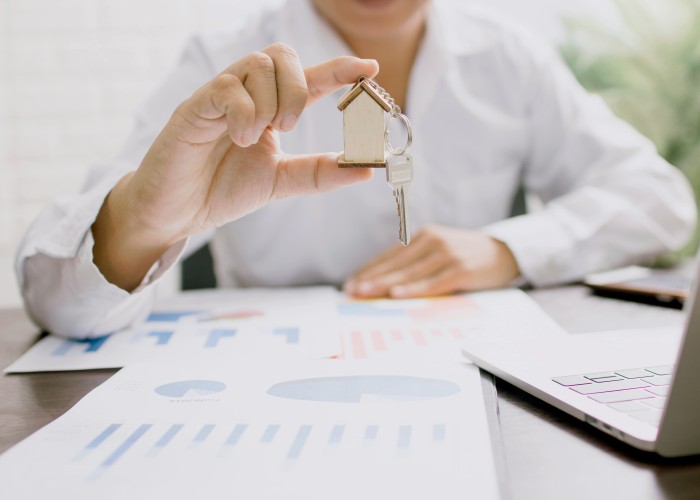If you’re planning to buy property in the United States—whether it’s a house for sale, land for sale, or even commercial real estate—understanding your mortgage options is essential. Two of the most common types of home loans are fixed-rate mortgages and adjustable-rate mortgages (ARMs). Each comes with its own set of benefits and trade-offs, and the right one for you depends on your financial goals, lifestyle, and long-term plans. Fixed vs Adjustable Rate Mortgages Explained.
At US PROPERTY MARKET BLOG, we break down complex real estate topics into easy, everyday language. This blog is for educational purposes only—we don’t sell properties or offer any real estate services. Our goal is to help readers make informed decisions as they explore the U.S. housing market.
What Is a Mortgage?
Before diving into fixed vs adjustable rates, let’s clarify what a mortgage is. A mortgage is a loan from a bank or financial institution used to buy property. You agree to repay the loan amount (called the principal), plus interest, over a set period—usually 15 or 30 years.
The interest rate determines how much you’ll pay on top of the loan, and the type of rate you choose will impact your monthly payments.
What Is a Fixed-Rate Mortgage?
A fixed-rate mortgage has an interest rate that stays the same for the entire life of the loan. That means your monthly principal and interest payments remain consistent—no surprises, no sudden jumps.
Pros of Fixed-Rate Mortgages
- Predictability: Your payments don’t change, which makes budgeting easier.
- Long-term stability: Great for buyers planning to stay in their home for many years.
- Protection from rate hikes: Even if national interest rates rise, your mortgage stays locked.
Cons of Fixed-Rate Mortgages
- Higher initial rate: Fixed loans often start with higher rates than ARMs.
- Less flexibility: You might pay more if you sell or refinance within a few years.
- Not ideal for short-term stays: If you’re not planning to stay long, you may not benefit from long-term rate stability.
What Is an Adjustable-Rate Mortgage (ARM)?
An adjustable-rate mortgage starts with a fixed interest rate for a limited time (typically 3, 5, 7, or 10 years), after which the rate adjusts periodically based on market conditions. For example, a 5/1 ARM means the rate is fixed for five years, then adjusts once every year. Fixed vs Adjustable Rate Mortgages Explained.
Pros of Adjustable-Rate Mortgages
- Lower initial rate: This often means lower payments during the initial fixed period.
- Potential savings: If interest rates drop, your payments could decrease.
- Ideal for short-term homeowners: If you plan to move or refinance within the fixed period, you can save money.
Cons of Adjustable-Rate Mortgages
- Uncertainty: After the fixed period, your rate and payments could rise.
- Hard to budget: Future payments may be higher than expected.
- Not ideal for long-term plans: The longer you keep the mortgage, the greater the risk of rate increases.
Key Differences: Fixed vs Adjustable Rate
| Feature | Fixed-Rate Mortgage | Adjustable-Rate Mortgage (ARM) |
|---|---|---|
| Interest Rate | Constant throughout term | Starts low, then changes |
| Monthly Payments | Stable and predictable | Can increase or decrease |
| Best For | Long-term homeowners | Short-term owners or refinancers |
| Initial Cost | Higher upfront interest | Lower initial payments |
| Risk Level | Low risk | Higher risk |
House Buying Tips: Choosing the Right Loan
Selecting the right mortgage starts with asking the right questions. Here are a few practical house buying tips to help you decide between fixed and adjustable rates:
- How long will you stay?
- Less than 5–7 years: An ARM might save you money.
- 10+ years: A fixed-rate mortgage offers stability.
- Can you handle rate increases?
- If a higher future payment would strain your budget, fixed is safer.
- Are you planning to rent out the property later?
- For investment property, consider how the loan affects rental income.
- Are interest rates low or high now?
- If rates are at historic lows, locking in a fixed rate might be wise.
Real Estate Investment Advice: Fixed or ARM for Investors?
If you’re buying property as an investment, such as a rental home or commercial real estate, your mortgage decision impacts cash flow and long-term profitability.
Why Investors May Choose an ARM
- Lower initial costs increase early-stage cash flow.
- Ideal if planning to sell the property before rate resets.
Why Some Investors Prefer Fixed Rates
- Predictable mortgage payments help with consistent budgeting.
- Less risk for long-term holds.
Whether you’re exploring homes for sale, land for sale, or planning to flip a home, always align your loan choice with your investment horizon and financial comfort level.
Tips Investment Property Buyers Should Keep in Mind
If you’re looking to buy real estate not just as a place to live, but as a smart financial move, consider these property investment tips:
- Calculate your return: Factor in mortgage payments, maintenance, taxes, and potential income.
- Research the neighborhood: Property value growth and rental demand affect your return.
- Choose financing that matches your goals: ARM for short-term gains, fixed for long-term stability.
Tips for Staging Home to Sell Later
If you’re buying with the goal of selling in a few years, keep in mind how your mortgage might impact resale value. Also, use these tips for staging home to sell:
- Keep the home clean, neutral, and well-lit.
- Highlight upgrades and improvements.
- Fix minor flaws—buyers notice details.
These efforts, paired with a well-structured loan, can maximize your profit when it’s time to sell.
Mortgage Terms to Know
Here’s a quick glossary of terms to make mortgage shopping easier:
- APR (Annual Percentage Rate): Includes interest and fees—important for comparing offers.
- Loan Term: The length of your mortgage (commonly 15 or 30 years).
- Rate Cap: For ARMs, limits how much your rate can increase at a time and over the life of the loan.
- Escrow: An account your lender uses to pay taxes and insurance on your behalf.
Land for Sale and Mortgage Options
Buying land for sale comes with different financing needs. Land loans usually:
- Require larger down payments
- Have shorter repayment terms
- May carry higher interest rates than standard mortgages
If you’re investing in land, consider talking to a local bank or credit union that specializes in these loan types. Fixed vs Adjustable Rate Mortgages Explained.
Common Myths About Fixed and Adjustable Rates
Let’s clear up a few misconceptions:
- Myth 1: Fixed is always better.
Not necessarily. In some cases, an ARM can save money, especially if you sell early. - Myth 2: ARMs are too risky.
With rate caps and short-term plans, the risk can be managed. - Myth 3: You can’t refinance an ARM.
You can refinance into a fixed loan if rates rise or your plans change.
Understanding these points helps you make smarter decisions about property for sale and loan options.
Final Thoughts
Choosing between a fixed-rate and adjustable-rate mortgage is one of the most important decisions you’ll make in your home buying journey. Whether you’re eyeing homes for sale for personal use or scouting your next investment property, your loan should match your goals, timeline, and risk comfort. Fixed vs Adjustable Rate Mortgages Explained.







Leave a Reply